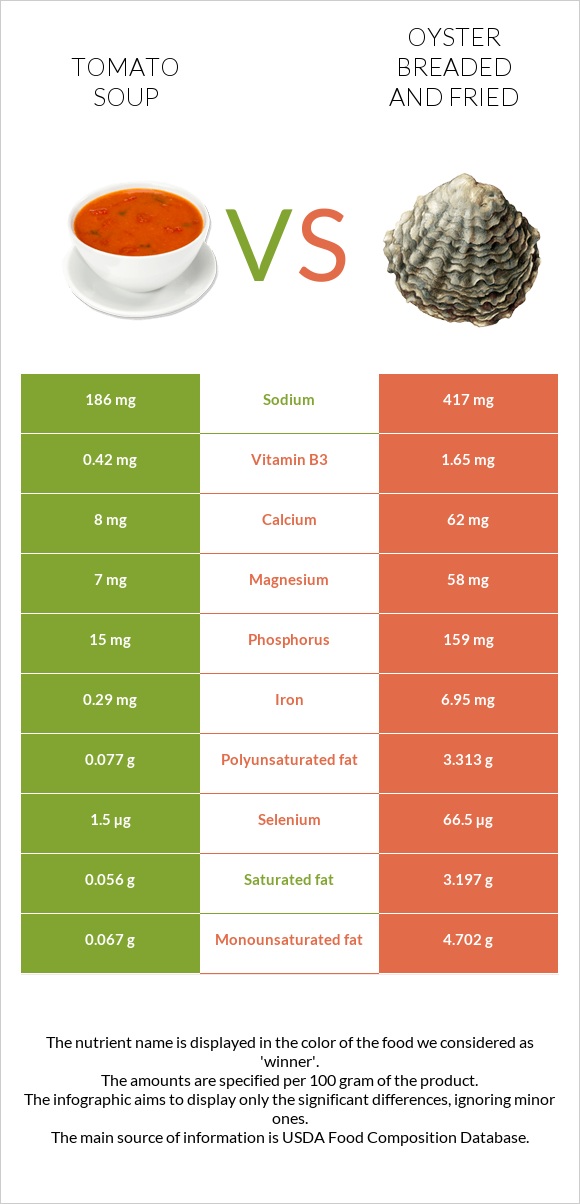Tomato soup vs. Oyster breaded and fried — In-Depth Nutrition Comparison
Compare
What are the differences between tomato soup and oyster breaded and fried?
- The amount of zinc, vitamin B12, copper, selenium, iron, phosphorus, manganese, and vitamin B2 in oyster breaded and fried is higher than in tomato soup.
- Oyster breaded and fried's daily need coverage for zinc is 791% more.
- Tomato soup has less saturated fat.
- Oyster breaded and fried has a lower glycemic index (0) than tomato soup (38).
We used Soup, tomato, canned, prepared with equal volume water, commercial and Mollusks, oyster, eastern, cooked, breaded, and fried types in this article.
Infographic

Infographic link
Mineral Comparison
Mineral comparison score is based on the number of minerals by which one or the other food is richer. The "coverage" charts below show how much of the daily needs can be covered by 300 grams of the food.
| Contains more PotassiumPotassium | +12.7% |
| Contains less SodiumSodium | -55.4% |
| Contains more MagnesiumMagnesium | +728.6% |
| Contains more CalciumCalcium | +675% |
| Contains more IronIron | +2296.6% |
| Contains more CopperCopper | +14706.9% |
| Contains more ZincZinc | +96711.1% |
| Contains more PhosphorusPhosphorus | +960% |
| Contains more ManganeseManganese | +631.3% |
| Contains more SeleniumSelenium | +4333.3% |
Vitamin Comparison
Vitamin comparison score is based on the number of vitamins by which one or the other food is richer. The "coverage" charts below show how much of the daily needs can be covered by 300 grams of the food.
| Contains more Vitamin CVitamin C | +65.8% |
| Contains more Vitamin EVitamin E | +∞% |
| Contains more Vitamin KVitamin K | +∞% |
| Contains more Vitamin AVitamin A | +800% |
| Contains more Vitamin B1Vitamin B1 | +650% |
| Contains more Vitamin B2Vitamin B2 | +2785.7% |
| Contains more Vitamin B3Vitamin B3 | +292.9% |
| Contains more Vitamin B6Vitamin B6 | +52.4% |
| Contains more Vitamin B12Vitamin B12 | +∞% |
| Contains more FolateFolate | +∞% |
All nutrients comparison - raw data values
| Nutrient |  |
 |
DV% diff. |
| Zinc | 0.09mg | 87.13mg | 791% |
| Vitamin B12 | 0µg | 15.63µg | 651% |
| Copper | 0.029mg | 4.294mg | 474% |
| Selenium | 1.5µg | 66.5µg | 118% |
| Iron | 0.29mg | 6.95mg | 83% |
| Cholesterol | 0mg | 71mg | 24% |
| Polyunsaturated fat | 0.077g | 3.313g | 22% |
| Phosphorus | 15mg | 159mg | 21% |
| Fats | 0.21g | 12.58g | 19% |
| Manganese | 0.067mg | 0.49mg | 18% |
| Protein | 0.71g | 8.77g | 16% |
| Vitamin B2 | 0.007mg | 0.202mg | 15% |
| Saturated fat | 0.056g | 3.197g | 14% |
| Magnesium | 7mg | 58mg | 12% |
| Monounsaturated fat | 0.067g | 4.702g | 12% |
| Vitamin B1 | 0.02mg | 0.15mg | 11% |
| Sodium | 186mg | 417mg | 10% |
| Vitamin A | 10µg | 90µg | 9% |
| Calories | 32kcal | 199kcal | 8% |
| Vitamin B3 | 0.42mg | 1.65mg | 8% |
| Folate | 0µg | 31µg | 8% |
| Calcium | 8mg | 62mg | 5% |
| Vitamin B5 | 0.27mg | 5% | |
| Vitamin C | 6.3mg | 3.8mg | 3% |
| Fiber | 0.5g | 2% | |
| Vitamin B6 | 0.042mg | 0.064mg | 2% |
| Carbs | 7.45g | 11.62g | 1% |
| Potassium | 275mg | 244mg | 1% |
| Vitamin E | 0.17mg | 1% | |
| Vitamin K | 1.5µg | 1% | |
| Choline | 6.3mg | 1% | |
| Net carbs | 6.95g | 11.62g | N/A |
| Sugar | 4.03g | N/A | |
| Tryptophan | 0.105mg | 0% | |
| Threonine | 0.365mg | 0% | |
| Isoleucine | 0.396mg | 0% | |
| Leucine | 0.638mg | 0% | |
| Lysine | 0.582mg | 0% | |
| Methionine | 0.199mg | 0% | |
| Phenylalanine | 0.352mg | 0% | |
| Valine | 0.409mg | 0% | |
| Histidine | 0.175mg | 0% | |
| Omega-3 - EPA | 0g | 0.202g | N/A |
| Omega-3 - DHA | 0g | 0.218g | N/A |
| Omega-3 - DPA | 0g | 0.048g | N/A |
Macronutrient Comparison
Macronutrient breakdown side-by-side comparison
Protein:
0.71 g
Fats:
0.21 g
Carbs:
7.45 g
Water:
90.55 g
Other:
1.08 g
Protein:
8.77 g
Fats:
12.58 g
Carbs:
11.62 g
Water:
64.72 g
Other:
2.31 g
| Contains more WaterWater | +39.9% |
| Contains more ProteinProtein | +1135.2% |
| Contains more FatsFats | +5890.5% |
| Contains more CarbsCarbs | +56% |
| Contains more OtherOther | +113.9% |
Fat Type Comparison
Fat type breakdown side-by-side comparison
Saturated fat:
Sat. Fat
0.056 g
Monounsaturated fat:
Mono. Fat
0.067 g
Polyunsaturated fat:
Poly. Fat
0.077 g
Saturated fat:
Sat. Fat
3.197 g
Monounsaturated fat:
Mono. Fat
4.702 g
Polyunsaturated fat:
Poly. Fat
3.313 g
| Contains less Sat. FatSaturated fat | -98.2% |
| Contains more Mono. FatMonounsaturated fat | +6917.9% |
| Contains more Poly. FatPolyunsaturated fat | +4202.6% |